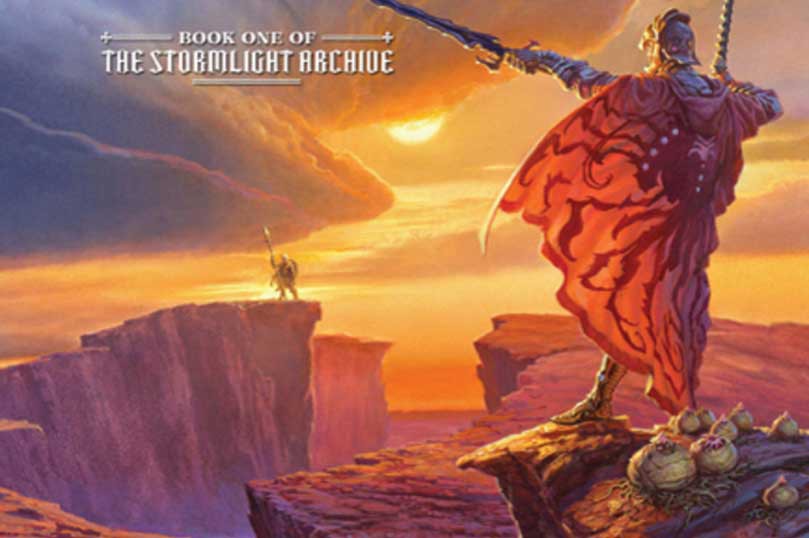

And though it has a beginning, here on this page, my quest can never truly end. I cannot call this book a story, for it fails at its most fundamental to be a story. You cannot pick the destination, only the path.’ It is what you will love, why you will hurt, when you will dream, and how you will die. ‘The question,’ she replied, ‘is not whether you will love, hurt, dream, and die. ‘So I can but repeat what has been done before?’ The past is the future, and as each man has lived, so must you.’ 'How is this possible?’ I asked in return. Those words came to me from one who claimed to have seen the future.

“ You must find the most important words a man can say. It's possible that this is part of a foreword.

Jasnah reads the entirety of The Way of Kings on the night of Gavilar's funeral, but only an early section is quoted, describing how a meeting with a supposed prophet caused Nohadon to set out on his journey, and explaining the structure of the book. Note: apart from the postscript and the eighth parable, none of the excerpts are named or numbered as such, the names given here are purely informal. Odium destroyed this particular copy in an attempt to break Dalinar's spirit however, by then he had taken its teachings to heart. When the time came to confront Odium at the Battle of Thaylen Field, Dalinar decided to carry the book with him rather than taking any weapon. In addition, two of his visions, one of which didn't come from Stormfather, were concerned with Nohadon and his work. Over the following years, he re-listened to it multiple times and began to base his own outlook on the world on its teachings. Following his brother's death, he began to put himself back together after listening to Jasnah Kholin read it. In addition, The Way of Kings is of great personal importance to Dalinar. Interestingly, both began to receive Almighty's visions through the Stormfather after they began to listen to The Way of Kings. After having it read to them several times, they become more and more honorable, which is a large contrast to typical modern Alethi behavior. This book had enormous impact on both Gavilar Kholin and, later, Dalinar Kholin. In particular, it appears as though the Order of Bondsmiths owns much to its teachings, as the very first lines suggest their Third Ideal. It's suggested that their Ideals were based off the book. Though Surgebinding predates Nohadon, the ancient Knights Radiant were heavily influenced by The Way of Kings. A major force behind this were the Vanrial, an order of artists dedicated to preserving ancient texts and songs. Unlike most other literature and documents from that era, which were preserved only in Dawnchant and thus, until recently, impossible to read, The Way of Kings was continuously translated, ensuring its survival in the public consciousness. Influence Īt around five millennia old, The Way of Kings is one of the oldest known texts to have survived to the present day. In addition, it's possible that some details have been lost or altered over the ages.

In another vision, Nohadon asserts that he did make the journey that forms the basis for the stories however, the factuality of the individual parables is disputable. It's uncertain how many of the events the book describes are real, and how many are purely metaphorical. Thus, while it does exemplify the virtues of a ruler, it is meant to act as an allegory rather than a method by which to inspire others. As is revealed by Dalinar's visions, he wrote the book after he had already risen to power. The book was written by Nohadon, an ancient king who lived and reigned after one of the Desolations. You might say I wrote an entire book about them. In this manner, he gains the respect and loyalty of his followers. In each story, the narrator always strives to lead by example, despite the objections of those close to him. Each known parable presents a situation or a problem that the narrator comes across, then a solution or strike of understanding and, finally, philosophical musings on how the situation relates to the duties of a king. The book is composed of an introduction, where the narrator makes the decision to set out, forty parables concerning different aspects of kingship, and a postscript where he summarizes his experiences. Rather than taking an Oathgate, as his family does, he instead travels alone and on foot, encountering a number of thought-provoking scenarios. In particular, it focuses on a journey he undertakes between the cities of Abamabar and Urithiru, with his decision to go serving as the framing device for the entire piece. The book is written as a narrative of the life of Nohadon, an ancient king, as he acts as a ruler should, with honor and dignity.


 0 kommentar(er)
0 kommentar(er)
